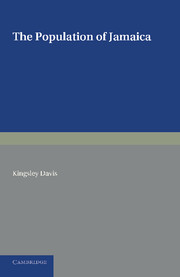Book contents
- Frontmatter
- The Conservation Foundation
- Contents
- List of Figures
- List of Tables
- Preface
- INTRODUCTION
- CHAPTER 1 DEMOGRAPHIC MATERIAL AVAILABLE
- CHAPTER 2 GROWTH OF THE POPULATION
- CHAPTER 3 MAJOR CHARACTERISTICS OF THE POPULATION
- CHAPTER 4 CURRENTS OF EXTERNAL MIGRATION
- CHAPTER 5 INTERNAL MIGRATION
- CHAPTER 6 MORTALITY
- CHAPTER 7 CHANGING PATTERNS OF REPRODUCTION
- CHAPTER 8 FERTILITY, MATING AND ILLEGITIMACY
- CHAPTER 9 GROWTH PROSPECTS
- APPENDICES
- Index of Names
- Index of Subjects
CHAPTER 2 - GROWTH OF THE POPULATION
Published online by Cambridge University Press: 05 June 2016
- Frontmatter
- The Conservation Foundation
- Contents
- List of Figures
- List of Tables
- Preface
- INTRODUCTION
- CHAPTER 1 DEMOGRAPHIC MATERIAL AVAILABLE
- CHAPTER 2 GROWTH OF THE POPULATION
- CHAPTER 3 MAJOR CHARACTERISTICS OF THE POPULATION
- CHAPTER 4 CURRENTS OF EXTERNAL MIGRATION
- CHAPTER 5 INTERNAL MIGRATION
- CHAPTER 6 MORTALITY
- CHAPTER 7 CHANGING PATTERNS OF REPRODUCTION
- CHAPTER 8 FERTILITY, MATING AND ILLEGITIMACY
- CHAPTER 9 GROWTH PROSPECTS
- APPENDICES
- Index of Names
- Index of Subjects
Summary
Fundamentally, the peopling of Jamaica, as indeed of the whole British West Indies, has been effected by means of the introduction of immigrants of one kind or another. The indigenous inhabitants have contributed nothing to its present population. Three such waves of immigration can be conveniently distinguished. Firstly, there was the introduction of Europeans, a small though highly important influx of planters, soldiers, indentured workers of various kinds, administrators, traders, professional men and others. These, coming singly or with their families, constituted the dominant class of the population. Immigration of this sort attained numerical significance only in the days of slavery when numerous efforts were made to induce their entry into the island. However, an influx of Europeans, mostly administrators and professional men, has persisted up to modern times, though the numbers involved have remained small. Secondly, there was the slave trade, which surpassed in scale all other movements into the island and which has provided the majority of its present population. Thirdly, there has been the more recent introduction of indentured workers and their families from foreign territories which, though small, represents an interesting phase of West Indies migration as a whole and which on these grounds is reserved for separate consideration in Chapter 4.
Immigration of Europeans and the slave trade dominated population movements in the regime of slavery. Under the conditions of mortality then prevailing, population increase among both classes, and indeed even the maintenance of existing numbers, could be assured only by constant large-scale recruitment from outside. After the termination of the slave trade population growth in Jamaica was almost exclusively determined by the balance of births and deaths. European immigration was of negligible importance, and though the introduction of indentured labourers did help to sustain the numbers of plantation workers, its effect on population growth as a whole was small. However, a new phase of migration developed in the last quarter of the nineteenth century— emigration to foreign territories—and this, as we shall show, was sufficient to affect sensibly the rates of growth between 1891 and 1921.
- Type
- Chapter
- Information
- The Population of Jamaica , pp. 29 - 58Publisher: Cambridge University PressPrint publication year: 2013

